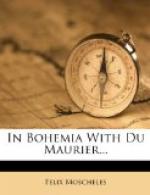[Illustration: Si nous AVIONS ETE CHEVAUX.]
[Illustration: F. S’il etait cheval.]
The sketch shows how it is being applied by a devoted Sister of Mercy.
[Illustration: Si nous AVIONS ETE MILITAIRES.]
In those days railway travelling was not as rapid as it is now, but one could get from Antwerp to Malines in about an hour, a circumstance which I frequently turned to account. Du Maurier’s mother had come to live with him, his sister joining them for a short time, and the home in quiet old Malines soon became a sort of haven of rest. I spent many a happy day and night there, on which occasions I am bound to say that the piano, requisitioned by me for some special purposes of musical caricature, detracted somewhat from the restfulness of the haven. However that may have been, such intrusion was never resented; my Swedish prima donna, or my qualifications as a basso profondo, or a brass-bandsman, were always treated with the greatest indulgence by the ladies, and my high soprano flourished and positively reached unknown altitudes under the beneficent sunshine of their applause. (For all that I never attempted Chopin’s “Impromptu.”)
[Illustration: “Ce sacre vesicatoire.”]
[Illustration: Isabel du Maurier.]
Then du Maurier would sing the French “romance” or the English song, or he would “dire la chansonnette,” and what with his sympathetic tenor and his intuitive knowledge of music, he seemed to be able to express more than many who had had the advantage of a musical training. A few old letters of his remind me that we were audacious enough to write verses and music, he doing the former, I the latter.
“Here’s something I particularly want you to do,” he writes. “Take strong coffee, inspire yourself, think of your ‘Ideal,’ and compose some very pretty music to the enclosed words, with which Rag’s ideal flame has inspired Rag—surtout, let it be as good as possible, with accompaniment a l’avenant. An alteration in the music of each stanza would render the gradation of energy expressed in the words, ’Je compte sur toi.’” (How du Maurier came by the name of “Rag” I must tell later on.) Then follow the words:—
CHANSON.
D’apres un barde Britannique.[1]
Les sources vont a la riviere
Et la riviere a l’ocean;
Les monts embrassent la lumiere,
Le vent du ciel se mele au
vent;
Contre le flot, le flot se presse;
Rien ne vit seul—tout
semble, ici,
Se fondre en la commune ivresse....
Et pourquoi pas nous deux
aussi?
Vois le soleil etreint la terre,
Qui rougit d’aise a
son coucher—
La lune etreint les flots, qu’eclaire
Son rayon doux comme un baiser;
Les moindres fleurs ont des tendresses
Pour leurs pareilles d’ici-bas
Que valent toutes ces caresses
Si tu ne me caresses pas?[2]




